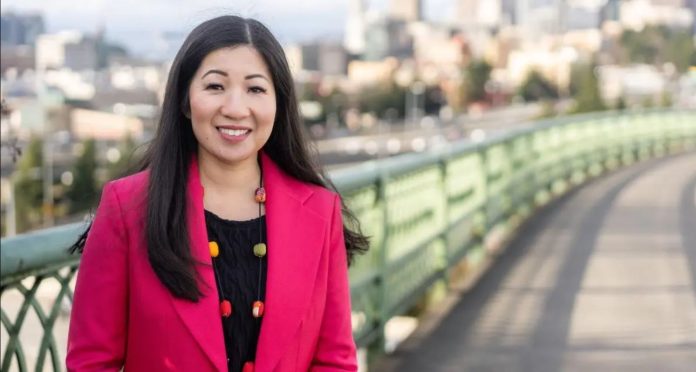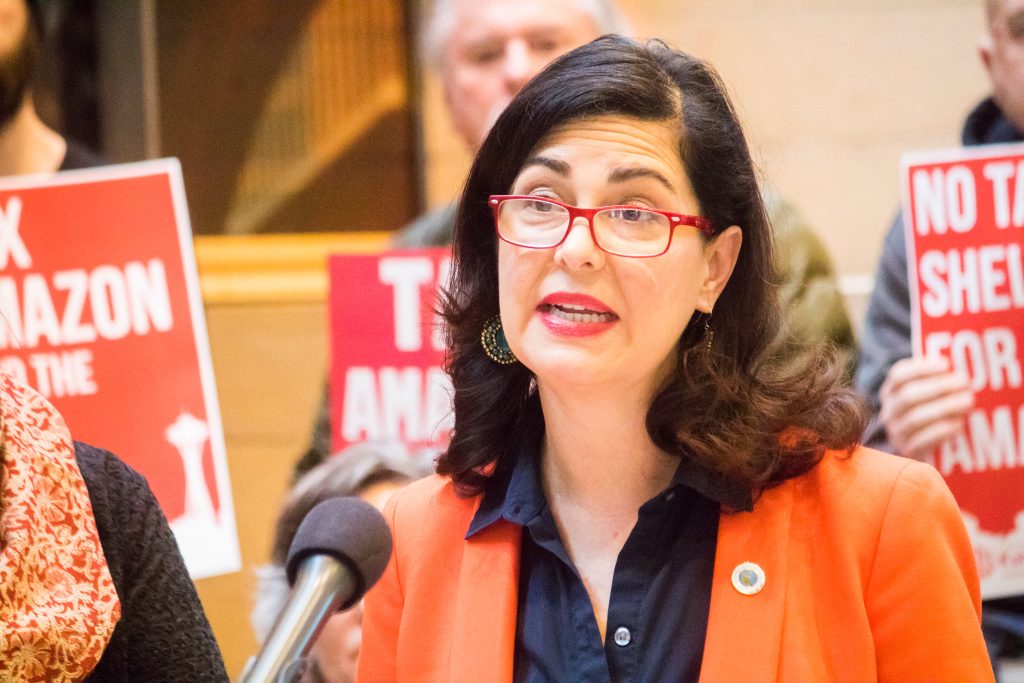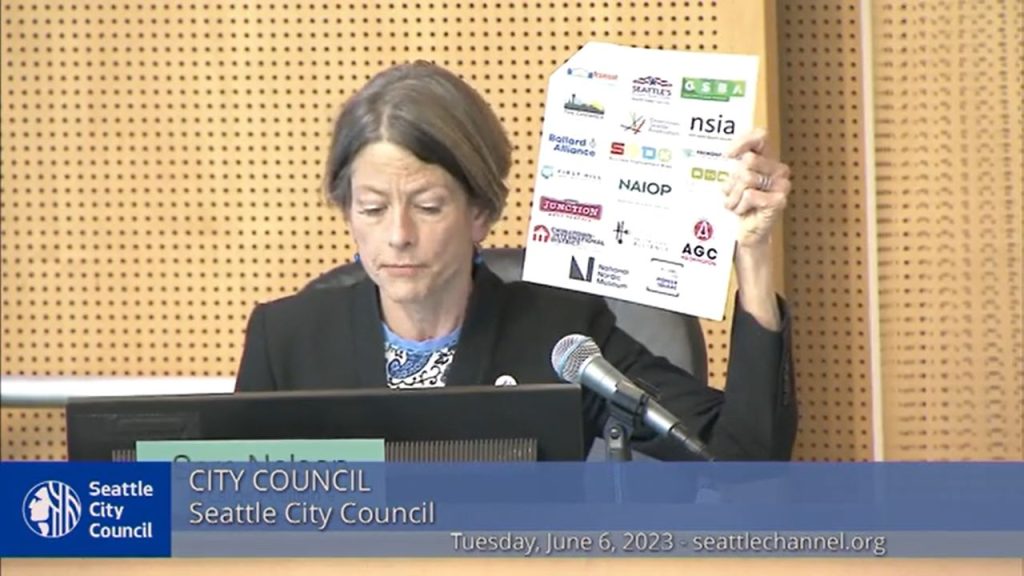
Morales cried foul after her colleagues installed her political opponent under a cloud of megadonor pressure.
Today the Seattle City Council appointed candidate Tanya Woo to be their ninth member, serving a 10-month stint filling the vacancy created by Teresa Mosqueda winning a King Council Council seat. Councilmembers Maritza Rivera, Rob Saka, Bob Kettle, Cathy Moore, and Sara Nelson voted for Tanya Woo, giving her the required five votes.
The other three councilmembers stuck with the candidates they nominated to the final eight last week; Dan Strauss supported Vivian Song, Tammy Morales voted for Mari Sugiyama, and Joy Hollingsworth backed Linh Thai. The appointed member will serve until voters elect a councilmember to serve the last year of Mosqueda’s term in the November election. Woo’s committee assignments will include land use, transportation, housing, and chairing the Sustainability, City Light, Arts and Culture Committee.
Both Morales and Council President Nelson alluded to an email that long-time lobbyist Tim Ceis circulated ahead of the vote, urging major political donors to pressure councilmembers to vote for Woo and arguing newly elected councilmembers owed it to centrist and conservative donors after they poured so much cash into their campaigns and secured their victories. PubliCola obtained and published the email, noting “Ceis’ partner is Rachel Smith, the head of the Seattle Metro Chamber of Commerce — another group with a strong interest in increasing the current business-backed supermajority on the council.”
“I don’t believe all of you worked so hard and gave so much to let unions and the left decide who gets this seat,” Ceis told his donor friends. “Tanya is good on business issues, strong on public safety, and lives and works in the Chinatown/International District. I urge you to email or call City Councilmembers and endorse Tanya Woo. My intel says that Tanya has six votes but that a union campaign could cause some of that support to weaken. Let’s not take that chance.”
In an op-ed in The Urbanist, Robert Cruickshank argued Ceis’ comments unmasked Nelson’s austerity-minded conservative agenda to appease big business by slashing government spending and keep the campaign donations rolling. With Seattle facing a $250 million budget shortfall, such an approach would entail steep cuts to social services. Nelson endorsed Woo in her District 2 council bid, in addition to newcomers Saka, Hollingsworth, Rivera, and Moore, cementing a new centrist supermajority and clearing her way to be tapped for council president.
In addition to overseeing big-donor-backed political action committees that spend millions helping to win elections for center-right candidates and causes, Ceis also serves in the Harrell administration after being tapped as “community consensus” builder for Sound Transit 3 light rail plans, pulling in $310,000 even as the process has floundered with numerous delays and no clear end in sight.
Nelson seemed to regret Ceis’ comments — or at least the “weaponization” of them — for putting a cloud over the process, but she ultimately voted the way he wanted. Morales, on the other hand, criticized the move as anti-democratic and rejected Ceis’ anointed candidate.
“I am disappointed in how this process turned out,” Morales said in remarks ahead of the vote. “This appointment process should have been set up to give all candidates a fair shake. It should have been about identifying someone who can hit the ground running someone who can deliver for the entire city. But instead it did become about big business telling donors that they earned the right to tell this council who to choose — and that is deeply problematic and it is anti-democratic.”

Voters don’t want monied interests to buy elections either, Morales argued. While the five members who backed Woo had stressed collegiality and collaboration in their remarks thus far into their terms, Morales contended Woo’s appointment broke from that principle, saying it did not strike her as collegial to appoint her primary opponent.
“Seattle voters have been clear over and over again, that they reject the notion that special interests have a right to buy our elections, and it does all of us a disservice when we muddy the waters of what is supposed to be a clear and transparent process,” Morales continued. “As I said at our first council meeting of the year, I will do my best to work with this council to give the people of Seattle the services they need and the services they deserve. And to help create a culture of collegiality. We’ve all said that we all agree that that is important. And I need to be clear that this council nominated two of my general election opponents to serve as finalists.”
In addition to Woo, Mark Solomon, a Seattle Police Department coordinator who ran against Morales in 2019, also won a spot on the final eight via a Saka nomination. Rather than recruit from her political opponents, Morales said they should choose a candidate similar to Mosqueda, who won both of her city council elections decisively and brought expertise on budgeting, land use, and affordable housing. Such experience could prove helpful in a year the City must solve a budget crisis and finalize and pass a Seattle Comprehensive Plan update that is woefully behind schedule to meet state deadline.
“Colleagues, today we have a very important choice to make,” Morales said. “It’s one that the voters of our city took two years ago when they voted to reelect Teresa Mosqueda with 150,000 votes. With this vote they voted for someone who has a deep knowledge of land use of affordable housing and who would know how to lead the city through budget crisis. But Teresa is not here.”
Morales raised the worry that anointing the big business candidate right after she lost an election would stoke political cynicism and alienate people from participating in democracy.
“Today we must choose to put the needs of our constituents above all else. If we don’t and if this whole process was a foregone conclusion, months in the making will be doing everybody a disservice including this body and the city and everyone who relies on us to make informed crucial decisions about the things that affect their daily lives because of this,” Morales said. “So this is a pivotal moment to ask who we are as a city who we are as Seattleites this is just the beginning of this conversation about democracy, especially in this particular year when there is so much cynicism already been stoked at the national level.”
In her comments ahead of the vote, Nelson argued the process still had integrity due to the many hours of work and vetting and suggested that Ceis’ comments were being unfairly weaponized against the centrist cause.
“Let’s not let the weaponization of a leaked third-party email distract us from what should be a celebration of making this body whole so we can go about the important work of the city,” Nelson said. “I believe that can serve as an effort to cast doubt on the integrity of this process in the outcome of our decision today. It’s also disrespectful in the hours and hours of work that legislative department staff put into running a clean process, and it can be insulting to the 20 days of due diligence this council is put into vetting candidates in good faith.”

If Ceis — nicknamed “The Shark” going back to his days as deputy mayor in the Nickels administration — wants to spout off and urge donors’ arms to turn the screws on councilmembers, that’s all part of the game, the council president seemed to argue. Earlier in the process, Nelson stressed she wanted a candidate who would run for the seat in November and be in a strong position win, which is a break from recent council norms of appointing a caretaker to vacancies. Nelson’s view seemed to be that — with the help of Ceis and his allies — Woo was in such a position.
In her inaugural remarks, Woo either misspoke or seemed to think she already had the November election in the bag, saying she looked forward to serving with new colleagues not just for the rest of the year, but the “next couple of years.” Perhaps with that reelection in mind, she also extended an olive branch to unions that largely backed Song by granting her the MLK Labor Council endorsement.
“And [I’m] so excited that we are friends, and I’m excited to serve amongst you and with you in the next couple of years,” Woo said. “And we’ll want to focus on serving you. The unions are the backbone of our city. I want to build more collaboration and especially on the council a sense of unity collaboration and communication, and my doors open; please come and visit and let me know how I can help.”
In contrast, Ceis saw labor more as a heel than a backbone and argued labor support tainted a candidate.
“The Building Trade unions and the MLK Labor Council have started a campaign to get Vivian Song appointed,” Ceis told his donors. “I know some of you may have met with her and come away with the impression she could be another moderate voice like the others we supported and elected. But I’m not so sure. For instance, she endorsed the left lane candidates like Ron Davis and Teresa Mosqueda.”
Ceis appeared spiteful about not getting to dip into the coffers or building trade unions to fund all his mailers and other independent expenditures. He urged centrist donors to throw their money around and remind councilmembers of their generosity.
“You were there when we needed to elect a new and moderate City Council. When I called the Building Trades for help? We didn’t get any,” Ceis said. “The independent campaign expenditure success earned you the right to let the Council know not to offer the left the consolation prize of this Council seat. Please support Tanya Woo and let the Council know about it.”
Tuesday’s appointment vote showed the tactic worked and the Shark is still at the top of Seattle’s political food chain. Ceis pledged to take council back in 2019, but raised so much money (largely from Amazon) that it backfired, firing up a wave of progressive turnout that swamped the prodigious spending he guided. Four years later, Ceis has his revenge and a council doing his bidding. How long it will last is up to voters.
Doug Trumm is publisher of The Urbanist. An Urbanist writer since 2015, he dreams of pedestrian streets, bus lanes, and a mass-timber building spree to end our housing crisis. He graduated from the Evans School of Public Policy and Governance at the University of Washington in 2019. He lives in Seattle's Fremont neighborhood and loves to explore the city by foot and by bike.

